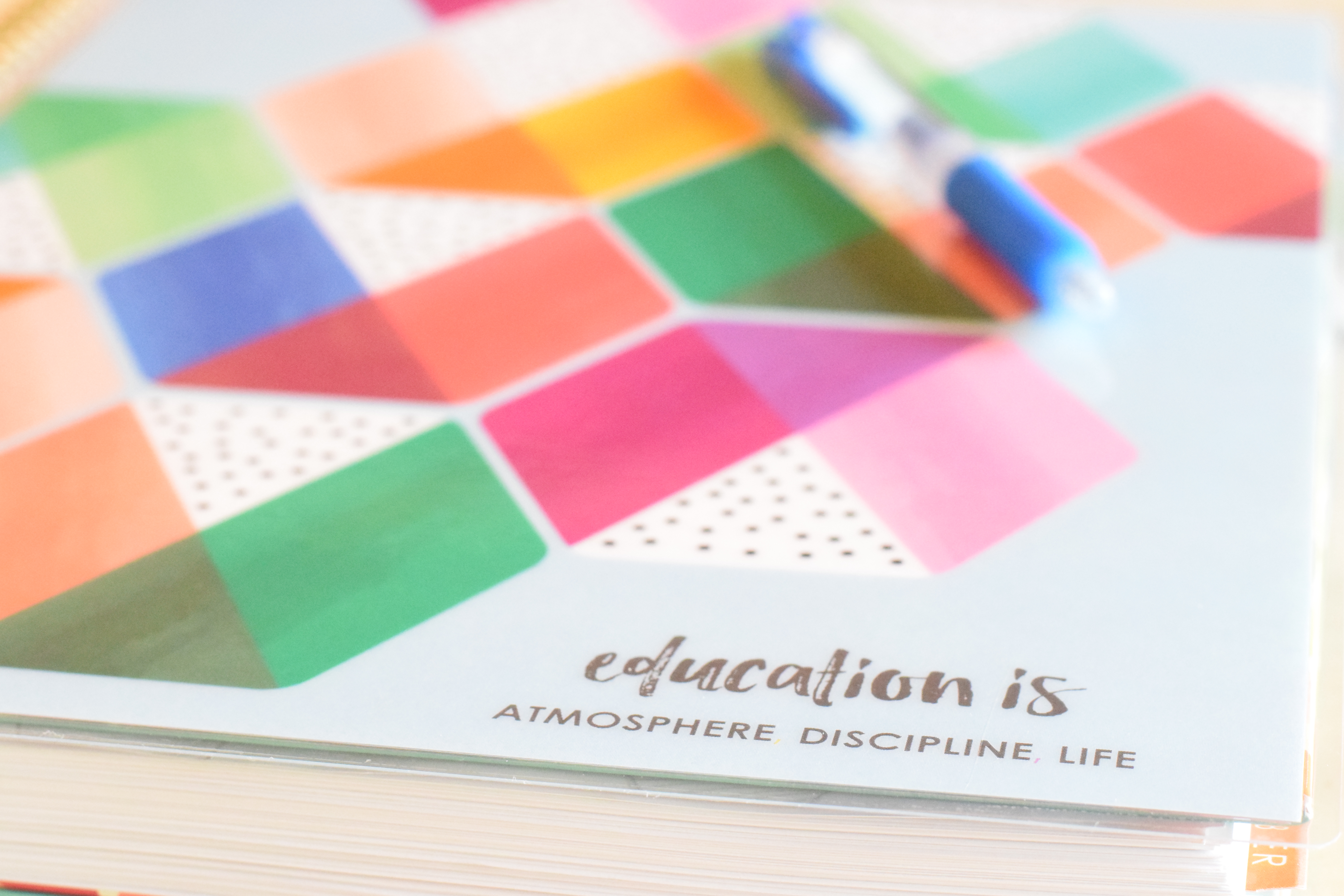Let Them Wonder
As a classical home educator I sometimes focus on just doing the next thing.
I’m living this knees-to-the-ground work; it isn’t a theory, or an article – this is real life. Babies and teens; dishes and laundry; books and discussion; active work and scholé – I invest myself wholeheartedly, and there are some days I barely keep up.
Sound familiar? In living out the nitty-gritty we may look past the grander perspective. We may not consider at the beginning of a day that we are literally, brick by brick, rebuilding a Christian culture through our very ordinary days.
There was a particular day a few years ago that stands out in my memory in which I was privileged to see the grander perspective within the smallness of a day.
The day started in an ordinary way for us, which is to say that it was naturally full, and my plans and booklists had been considered and lived enough that they were moving along on smooth rails (or smooth enough), which was reassuring. Our Morning Basket of work having been completed, we enjoyed a short break and began to maneuver toward the books for the day.
Bigger kids situated themselves in quiet corners of the house for their reading; I prepared books and lessons for my younger children. In the midst of my tidying, I happened to pass a window, and looking out, I noticed that my two younger children had slipped out of doors and were sitting quietly on the front porch steps.
I hastily checked the time. Yes, I could leave them alone for a few minutes…but our morning preparations were complete and my big kids were working – now was the time to work with my younger students. My carefully considered plans were before me.
I stood there at the window for a moment and it almost seemed as if I could sense time slowing her usual pace. The morning fog hadn’t yet lifted and it spread out over our hills on that cool autumn morning in an enchanting, mysterious way. The children were completely content there. I sensed that intruding would irreparably sever the beauty in that moment…so I set our plans down, reminding myself that this moment was exactly the kind of moment I had in mind when I considered those plans in the first place, leaving a generous amount of margin in our daily schedule. That margin – the unstructured “white space” – is meant for that something you can’t plan for. Margin gives space and time to let them wonder.
“What excites the passion of wonder is the confrontation of mystery.”
(Dennis Quinn, The Muses as Pedagogues of the Liberal Arts)
Confronting mystery? The passion of wonder?
We’ve all heard the word – wonder – parsed around, here and there, in various circles. It seems almost cliché. Maybe it’s because we hear this idea shared in ways that seem flowery or sentimental that we are tempted to eschew it, as if it were meant only for those “perfect” classical educators. But if we remove those prejudices, the idea is simple, insisting that we “become as little children” (Matthew 18:13).
It is so integral that a classical education – one which cultivates virtue and wisdom and is rooted in the good, true, and beautiful – cannot be pursued without first going through wonder. Aristotle was perhaps one of the first (of many) who observed that “wisdom begins in wonder.” So perhaps we could stop and consider it anew, not because it is for the perfect, but because it is worthwhile. It is, in fact, for the ordinary. For you and me and our children. And it is foundational.
The Oxford Dictionary defines wonder as ‘surprise’ or ‘admiration caused by something beautiful, unexpected, unfamiliar or inexplicable.’ Notice that there is no implied resolution to this admiration. In other words, we can wonder, be in awe, admire, question – and we can stop right there and just let it be, or we may feel invited to go “further up, further in.” Wonder lays the foundation.
Nascantur In Admiratione – let them be born in wonder. (Motto of the Integrated Humanities Program, University of Kansas, 1966-1982)
This idea of wonder began for me as something I interiorly understood as good, but through the years it developed and grew into something very rich. I could see that my young children were so naturally tuned to wonder that I could learn much from them – and did. I learned that wonder is very much alive in the teen years; I just need to see with their eyes. And I learned that wonder becomes a part of the atmosphere not because I plan it, but because I model it. It is, very simply, confronting the “mystery” found in a thing or idea – a ladybug, bluebird, rock, mud puddle, sunflower, the stars – and admiring the beauty, wondering at how they are, how they work, how it came to be, Who put them there in the first place? It is an idea that invites humility – a certain smallness. And in that humility, we’re open and the ground of our mind is made receptive and the seeds of wisdom can grow there.
In letting them wonder, we do nothing less than our part in rebuilding Christian culture. Without wonder there is snobbery, selfishness, a sort of anti-empathy. You can look around today to see our culture replete with that and it doesn’t take a great deal of logical-connect-the-dots to know where that leads. John Senior says it lead to the Death of Christian Culture. Rebuilding culture will be a road that passes through wonder.
Toward the Practical – Open to Wonder
Imagine that you are the mom standing there at my window observing those children quietly looking into the gardens, the hills, the fog layered over it all. Imagine those are your children. Would you interrupt them? Would you tap on the window and give them a five minute warning? Would you point them to the schedule and redirect them, knowing that, practically speaking, your day demands a certain attentiveness to plans and schedules (which are good and useful tools)?
I could have done that, and I’ll confess to you that I thought about it for a brief moment. But there is more at stake here than the schedule, the lesson plans, the day or even the term of work. We are educating persons made in the Image of God, and they seek beauty. When they find beauty – when our children encounter a mystery and wonder, we are faced with a choice:
Ignore it and redirect,
Or rebuild culture one ordinary little brick at a time.
Let them wonder.
- Model it first. Choose sincerity – not sentimentality. Learn to see again with the same eyes you had when you were a child – when you encountered mysteries around every corner. Learn to see them again.
- Go outside. Wonder is everywhere in God’s Creation. Give yourself permission to truly delight in some small thing that you encounter today. Confront the mystery of a dewdrop, a bug, a pattern of symmetry found in a leaf.
- Wonder is often (not always) found in moments of leisure – scholé. Consider your days carefully – your schedule and your outside the home commitments – and leave room for wonder. Nothing snuffs out wonder faster than too much structure.
- Wonder can sometimes be quiet and contemplative, and then there are those of us with boys. Sometimes moments of wonder are loud, active and seem chaotic. Be careful that you don’t miss (or worse – squelch) the genuine and authentic wonder of a boy while waiting in vain for something “idyllic” and not real. Ask yourself: are they admiring, in awe, inquisitive, looking to know a thing? If yes, let them wonder!
- Look at the stars. No curriculum. No agenda. Just you, your kids, and the night sky. Nothing communicates our smallness and God’s magnificence – how fearfully and wonderfully we are made – like gazing at the heavens!
- Teens like to spend time confronting the mystery and wonder within an idea. At this point, they’ve met these ideas, and now they’re really grappling with them. Encounter it and engage it. Be sincere. Challenge them toward truth! It is knowable!
- Rich, living books introduce ideas and invite wonder. Fill your days with them.
As my young children continued to sit on the front porch, I chose to step aside and allow them to encounter that moment. Eventually, they wanted to express some of the things they saw through a drawing. Wonder invited them to look closer, observe more details, which led to some rich questions and invited reading to understand more.
Tiny seeds of wonder leading to wisdom – who knows what the Holy Spirit will do with them!
I’m right alongside you – rebuilding culture, confronting mystery and wondering…about rocks, rainbows, and ideas like liberty and honor! What are the ways you encourage and nurture wonder in your home?
How do you ensure that wonder is woven into the atmosphere of your ordinary days?








‘Choose sincerity – not sentimentality’ – so true, otherwise we might not get anything done! Sometimes it takes some wisdom to know when to pause & put the schedule or agenda aside.
You’re so right, Carol! That could possibly be a post all on its own – the wisdom in choosing! It’s a moment we probably all meet each and every day, and the decision must vary between discipline and margin so that there is balance. I really appreciate your point! Yep – wisdom in knowing when to step aside and when to invite a student toward the discipline of the moment.
What a wonderful post! Thank you Jennifer for encouraging us all to embrace those times of wonder. Fall is one of my favorite seasons. Well, we’ve had some days of very beautiful Fall weather this week. And so there’s been a couple of days where the girls wanted to stay outside a little longer when it was close to our usual dinner time. So we decided to set the usual dinner time schedule aside and have dinner later than normal so they could stay outside longer to enjoy the beautiful weather. 🙂
Oh, thank you, Karen! I’m so enjoying this fall weather, too! We’ve been walking more, and noticing more! It’s a delightful time for inviting wonder isn’t it?!
Thank you so much. I needed to hear this today- especially the part about white space. Before I read it, I cancelled 2 things which were scheduled this afternoon, just because I am getting too close to the edge. Too much is going on in our schedule. There is never a rest. I am going to spend some time in prayer and ask the Holy Spirit to guide me and us in this.
The temperature finally dropped here this morning. My kids are outside right now trying on jackets and running and shouting in the yard experiencing the wonder of cooler weather! Though it will heat up this afternoon again, this is a breath of fresh air, literally. We need some wonder today. A chance to stop, breathe, look and just be right where we are.
You know what, Phoebe, this was probably one of the hardest, and yet most valuable lessons that I have learned in our 13 years of home education. Margin is more important than activity. We live a life that sometimes asks that some seasons be spent a little more actively than others, but your approach of prayerfully considering this and asking the Holy Spirit for wisdom in making the best choice for your family will not fail you! The secret for me was in learning that sometimes I had to say, “no thank you,” to a very good thing in order to say, “yes,” to the more important thing which was our valued time together, time at home, time to have white space and margin. Saying no thank-you for a positive reason allowed me to be cheerful and content with our decisions, and it allowed me to prioritize more clearly.
Peter Kreeft says, “You don’t find time, you make time. To make time for anything you must first take that time away from something else.” This helped me see that I must be a steward of my/our time and do just what you’re doing, prayerfully consider opportunities. Ensuring that there is time enough for wonder to be nurtured during the day is my “more important thing” which allows me to joyfully say “no thank you” to other good opportunities that could possibly be a wonderful fit for another family.
Prayers for you as you discern!
How I needed this reminder today! I’ve been cramming way too much into our days, and we’ve had no where near enough margin to rest and wonder and delight in the beauty of God’s world…and I feel how it is cramping our style, hurting our learning, and making me crazy. Thank you for the nudge to loosen up and let wonder creep back in to our days.
Thank you so much for your kind words, Gina! It IS truly freeing and delightful when we carve out a little more space for rest in the day so that wonder has a place! I know this decision will reward you so much! Enjoy these days!
Jennifer, this is incredibly beautiful and inspiring!
Your nugget: “Sometimes moments of wonder are loud, active and seem chaotic. Be careful that you don’t miss (or worse – squelch) the genuine and authentic wonder of a boy while waiting in vain for something “idyllic” and not real. Ask yourself: are they admiring, in awe, inquisitive, looking to know a thing? If yes, let them wonder!” is going front and center in my planner. That little nugget is gold.
Thanks so much, Sarah! I have to remind myself of that same thought very often!
An awesome read today Jen! Loved it 🙂
Thanks so much, Meredith! It’s so great to *see* you here!
I always love reading what you have to say Jen. Your words are so inspiring to me!
I have thankfully been able to embrace wonder in our home in these early years. I just hope I don’t lose that as my kids get older… I’ll have to save this post and pull it out every so often as a reminder. 🙂
Thanks, Lisa! You’re so right about the early years being a natural home for wonder! Chesterton once said that what he loved about childhood was that everything in it was wonder, and I just love that thought! It’s so true! And it always makes me think of Christ’s admonition to become like a little child. It brings it full circle for us, doesn’t it? To be fully alive, to be fully Christian, we must be like a child with our eyes always open to wonder! What a delightful way to live!
Jen, how nice to “see” you over here at Schole’ Sisters! Your words, as always, are thoughtful and inspirational. 🙂
I’ve been thinking about this concept of wonder all week and contemplating how to make it a part of our lives. There are a few things that bring me wonder (thanks, Sarah, for Teaching from Rest–almost through it), but for the most part, I am an incredibly practical woman and have to work at cultivating wonder in my own life, let alone my children’s lives. And then I read this morning in “A Western Way of Meditation” about the prayer of praise. How we see little glimpses of God’s beauty, goodness and intelligence and that leads us to give Him praise. “And praise, when flowing from a sincere sense of wonder, is a powerful stimulus to meditation” (Bryan 14). So this sense of wonder, then, is integral to our spiritual lives, our relationship with our Divine Love. Humbling words and ideas for one who has a hard time letting herself get lost in wonder.
To contemplate beauty is to approach God…..because all beauty points to Him, yes? Truth, beauty, they are all (just like Our Lady) pointing to Him. “Do what He tells you.” And often that is to….stop….and just be in His presence. Thanks, Jen….always…thanks!
Thank you! You have so much truth here. I hadn’t read it before, but I see it’s truth: Wisdom begins in wonder. I think we so often see the wonder in a small child (and my oldest is 6), I really hadn’t considered the wonder of a teen who is working over an idea in his mind, or of an active boy running about in the wind. Thanks for the perspective!
Soooo wonderful!! My eldest just turned 5 & in the last 2 months God took me on a journey to show me that homeschooling is for us!!! Can you recommend some books-that you refered to at the end of this blog?? Thank you!!!
Hi Jodie,
The living books I referred to at the end of the blog – that’s a long list! And the idea of selecting books that are rich, worthy and living is more about learning to discern in how we select books. In general, a living book is written by an author who is passionate about their subject. I’ve written extensively about living books here, so I’ll link you to a few posts that might get you started:
Two Simple Ways to Prepare the Soil for a Classical Education
Good to Great: Teaching Literature from Grammar to Rhetoric
Build a Considered Booklist
It’s my hope that these posts will point you in the right direction of finding some books, and also in learning how to discern the rich and worthy books you want to find – the ones that inspire and invite wonder!
You asked how I would respond to that situation, and I have allowed my children to “play” , but then feel somewhat guilty for not giving them structure to follow. I say play because it’s what first comes to mind when looking for examples of this in my kids lives. They are playing well as a group and using their imaginations to create a new scenario. Is that the same thing or am I on the wrong track?
I think you’re on the right track, Kelly! The key is that there is a time for discipline (education in the structured sense) and there is a time for play. The time spent in structured, formal education should not be so demanding or burdensome that it snuffs out any possibility of this scenario though. In general, the younger your kids, the more time they should have to play and observe so that their sense of wonder is fully developed.
There are probably some important distinctions to be made here with regard to structure and routine. Routine is needed by all children, regardless of age, and it should be reasonable. Small children thrive on routine – wake up times, meal times, tidy times, reading times. Routine can be flexible enough to accommodate pauses that allow children to be “born in wonder.” Structure is needed within education – discipline of habits of attention, following a lesson plan, completing work that ought to be completed. Here, too, a certain flexibility is needed, but not in eschewing the structure of the day in lieu of something else, rather the flexibility is seen when structure is lived out yet there is still time enough in the day to breathe, live, explore, seek wonder. In other words, don’t OVER-structure, make sure your structure (plans, formal education time) has enough margin (the white space – that unplanned time I refer to in the post.)
As far as feeling guilty when the children play – that’s an emotional response that is typically rooted in some fear of the unknown. Of course, there are times it’s a good prompt for self-discipline, too, so you’ll have to do some interior soul searching to determine where this guilt is coming from. If self-discipline is needed – brainstorm it! If this guilt is coming from a fear of some unknown (like…what if my very young children aren’t doing enough formal school because they’re playing?) – watch out for that! That’s an opportunity to make an act of the will and learn to trust. Letting guilt become a predominant emotion is a dangerous thing leading to all sorts of circuitous interior questions for a mom.
I do think you’re on the right track, Kelly, and I hope this encourages you to continue to encourage moments of wonder!